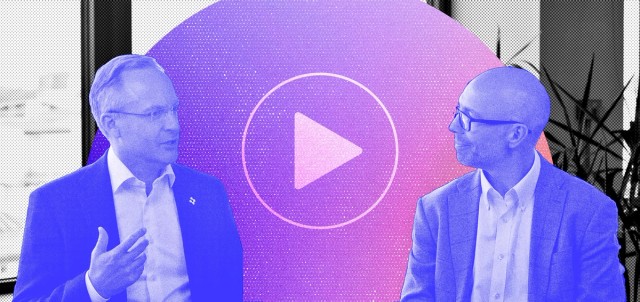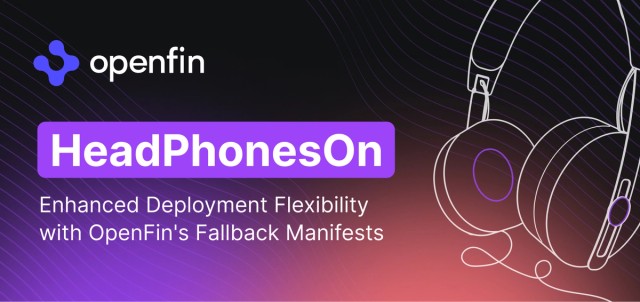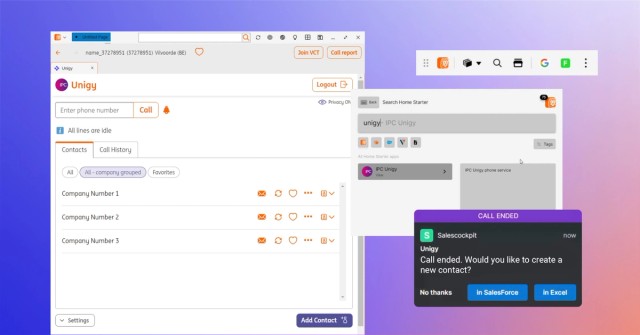November 9, 2023
Fireside Chat with OpenFin's Adam Toms & LSEG's Dean Berry
Dean Berry, Group Head of Workflows at LSEG, joins a discussion with OpenFin’s Adam Toms to discuss LSEG's vision for innovation and their recent partnership with both Microsoft and OpenFin.

—
London Stock Exchange Group (LSEG) recently announced its use of OpenFin's technology for its flagship LSEG Workspace platform. The partnership will leverage OpenFin's secure zero-install delivery model and container technology to simplify distribution of LSEG's next-generation data and analytics to customer desktops. With over 40,000 clients and 400,000 users in 190 countries, LSEG empowers customers to make confident investment, trading, and risk management decisions. Leveraging OpenFin now makes it effortless for customers to access LSEG's next-gen data and analytics from anywhere.
Igniting Innovation
Dean Berry, Group Head of Workflows at LSEG, joins a discussion with OpenFin’s Adam Toms to discuss LSEG's vision for innovation and their recent partnership with both Microsoft and OpenFin. They discuss LSEG’s goal to provide a truly open and frictionless platform, allowing end users to securely access and personalize content and workflows.
"We wanted to solve a problem that we saw, and that was the removal of friction from people's workflows and from their daily operating rhythm. I think OpenFin goes a long way to becoming the mechanism of choice there," says Dean Berry, Group Head of Workflows, LSEG.
Watch the full interview above or read the transcript below.
Transcript
ADAM TOMS: So I'm delighted to be joined by Dean Berry from London Stock Exchange group here at the OpenFin offices today, and we're going to explore a little bit more about the OpenFin and London Stock Exchange partnership.
DEAN BERRY: My name is Dean Berry; I work for the London Stock Exchange Group. I'm the Group Head of Workspace. And as part of that, I'm responsible for the businesses of trading, banking, investment management, and wealth management.
ADAM TOMS: So Dean, the London Stock Exchange Group has gone through a huge transformation over the last few years, whether it's been the acquisition of the Refinitiv business or your announcement of your strategic partnership with Microsoft late last year. I think it's a really interesting time to ask you the question:
What today is LSEG's vision for innovation?
DEAN BERRY: You're right; it's been a really exciting time. I think if we start with LSEG's purpose, we see ourselves at the heart of financial markets, and that's both from stability but also from a growth perspective as well. I think growth for us is one of our key tenets, and I think growth and innovation tie together really well. You referenced Microsoft; I think that is a hugely exciting partnership, but I think it's just one of many that we've been working on, which ties back to the heart of what we're doing, which is empowering customers to deliver on their agenda.
ADAM TOMS: I know many people have lots of questions about the Microsoft and London Stock Exchange Group partnership. What exactly will it mean to them, and when might they start to see some of this innovation arriving on their desktop?
DEAN BERRY: Sure, so we've made a number of public announcements, so I want to keep to that. But to summarize, we've talked about an initial 2-year period that we're working on, some key strategic initiatives. It's a long-term deal, it's a 10-year partnership. I really think this is a different type of partnership; this is not just a cloud deal. Clearly, cloud is super important, but this is about changing the way that both LSEG and Microsoft interact. Given the nature of Microsoft's business and our strength in financial services, I think it is a unique partnership. I also think the way that we interact with Microsoft is pretty unique, and I think the level of access and joint working practices that we've set up, even down to the level of squads and clusters being shared between LSEG and Microsoft. When we talk about innovation, I think that's really different; that is something that hasn't happened before, and I think we're going to deliver some pretty great stuff for customers.
ADAM TOMS: It's really not just about the products and the end-user point, but the journey of how you get there, how you decide what that outcome is for those customers.
DEAN BERRY: Absolutely, and let's be clear. Microsoft, as a tech company, wanted to partner with who we felt were the best, and I think there's a point, which is probably not lost on you guys, but when we talk about delivering to our clients, one of the key areas that people still need services onto their desktop is only one area, but it's key. Every single one of our clients has Microsoft as their ultimate desktop of choice. They clearly overlay things on top of that, but having that as the default across institutional clients is clearly a huge part of our experience.
ADAM TOMS: So, we've talked about London Stock Exchange Group's vision, the importance of that partnership with Microsoft, as well. I think as we continue down that path, we were really pleased as a company to announce our partnership with London Stock Exchange Group earlier this year. I know how important that is to us at OpenFin and how we view the partnership, but I'm curious to hear how London Stock Exchange Group thinks about OpenFin.
DEAN BERRY: We are not of the view that we should build or own everything that simply doesn't align with our thinking. We want to partner, whether it's Microsoft at scale with the best companies in their domain, and we see OpenFin very much in that space. So, albeit it's not the same scale as Microsoft, but of significant importance to us given the domain expertise that you guys have. We wanted to solve a problem that we saw, and that was the removal of friction from people's workflows and from their daily operating rhythm. I think OpenFin goes a long way to becoming the mechanism of choice there.
ADAM TOMS: One of the challenges with using OpenFin is very much about the end user. They've got lots of different applications on their desktop, lots of different data sources as well, and obviously, LSEG provides quite a few of those key applications and data services to users. So when you think about client experience, what does that look like?
DEAN BERRY: Client experience, firstly, I think is very personal. While we obviously want to be able to deliver at scale, we need to tailor that experience to the individual personas of clients that we have. When we break down our businesses, we think down to the level of the persona, which could be a commodities trader, an M&A banker, a research analyst. So we are there to deliver from scale but offer personalization and an experience that really meets the client where they are. People have lots of different needs, and we want to cater to those.
ADAM TOMS: Maybe just to extend from that, I think it's a good time for us to talk about what being open means. As a significant provider in financial services, what does openness mean to you in this context, and how you talk about meeting the clients where they are? Maybe just expand on that a little bit.
DEAN BERRY: For sure. We have a very strong belief that we should deliver to clients in an open way. That means not telling clients where they should consume from us. We have amazing data, content, venues, and a lot of services, but we will never have everything. Partnering with other companies is important to us, and that needs to be done in a cohesive way, recognizing that some clients simply don't want a fully curated experience. We will sell people a workspace license, and the clients will choose how they want to receive that information. That could be via the workspace UI using your container, but increasingly, people who could be OpenFin clients just want components, and we're more than happy to integrate those components into their desktop experience.
As we continue along that path of thinking about openness, we want to go much further than that and that's partly using Microsoft to us that is a significant channel. One thing hasn't changed in all the time that I've been doing this, people still use Excel. People still use PowerPoint. People are increasingly using Teams. We don't want to take people away from that. We want people to consume where they are. And I think the final point is also a recognition that given the kind of changing skill set of you know people who are coming out of school now, we have to understand that some clients don’t want any curate experience whether it be a component or full experience. They simply want an SDK, an API, and want to write their own Python scripts and be able to deliver that. For us, that's what we mean by open — the ecosystem of channels is fully open to our clients wherever and however they want. Clearly, we're device-agnostic, but it doesn't go far enough in my opinion; it needs to be much more than that.
ADAM TOMS: One of the things when we think about our technology and our service in the largest banks in the world is that security has always been a paramount concern for them. I'm curious to know how the London Stock Exchange Group thinks about security and what the considerations are for you.
DEAN BERRY: Security for LSEG is absolutely paramount. It's something that we pride ourselves on given our position in financial markets infrastructure. I think we've set a really high bar. The fact that we've chosen OpenFin tells you that we believe that you meet that bar. We have a lot of common clients who also believe the same. I think that's that's a kind of that testifies to our belief in that.
ADAM TOMS: One of the things OpenFin provides as part of the technology is continuous security updates and our co-ability of Chromium and the ability to get zero-day patches to customers rapidly. But it's really about also how you enable updates for applications themselves. And I think that deployment and update model has been really key for many of our clients, making sure that customers can deliver that innovation very rapidly. Has that been front of mind for LSEG?
DEAN BERRY: With OpenFin's deployment model, hat gives us the ability to package once, deliver clearly in a secure sandbox way to our clients, and actually deliver for our clients upgrades for them as we bring out new products, new features. We want to be able to deliver that really quickly. Without OpenFin, the time to deliver those increases. So we found that to be a really effective way to remove that friction.
ADAM TOMS: Earlier, Dean, you mentioned how Workspace has changed and how people don't necessarily want that prefixed kind of curated experience. How do you see data and analytics evolving in that sense?
DEAN BERRY: I think there are probably three points that I would make. I think the first one is very much around an extension of that open message. We continue to see more and more demand for non-closed systems. People don't want one-way interaction. They want to be able to push in, but also to be able to pull back. That is at the heart of what we believe as well. So we're there to facilitate. I think that trend is only going to continue as people want to integrate further with their own solutions. I think the second point, which is clearly topical, but I've probably never seen such a shift in the last months with Gen AI. Clearly, our partnership with Microsoft puts us in a great position to be working with some absolutely amazing industry leaders. The way that plays to that openness, you know, products like Co-Pilot that have been announced, we've only scratched the surface. I think this is going to fundamentally change the client experience, the discoverability, even the developer experience going forward. But all of that only really works if you are open. You can only go so far, and then you hit a closed door. I'm not sure that is really what our clients want. It's certainly not what they tell us that they want. I think the final point, maybe again, maybe counterintuitive, but I think it's important. We've actually seen the importance of the human, kind of remain. So while Gen AI is going to change a huge amount and it's going to remove a lot of processes that people do, the quality of the data and the driver, if you like, you know, someone said to me recently, 'What was Henry Ford famous for?' The answer used to be creating the automobile, and actually, I think the new answer is he created the driver, right? So that requires a human still. I think we really recognize that. In today's world, very few things are fully electronified. There is still a real need for some hybrid element, and I think we recognize that. We don’t want to push back on that, we want to facilitate that so the human and the machine can actually work together in harmony.
ADAM TOMS: I think that is a really interesting point—clearly the different perspectives of Microsoft delivering that for the London Stock Exchange Group with the services and also OpenFin and how we're trying to help that end user. I think you're absolutely right. It's like the end user is not going anywhere; it's definitely here to stay. But it's really about how we enhance and make that user more productive as possible and putting the client at the heart of everything that we do. Well, Dean, thank you so much for your time today. It's been fantastic talking to you.
Enjoyed this post? Share it!
Related Posts
All Posts ->
Featured
Enhanced Deployment Flexibility with OpenFin's Fallback Manifests
Thought Leadership

Featured
ING Integrates OpenFin for Salesforce to Optimize Workflows
Thought Leadership